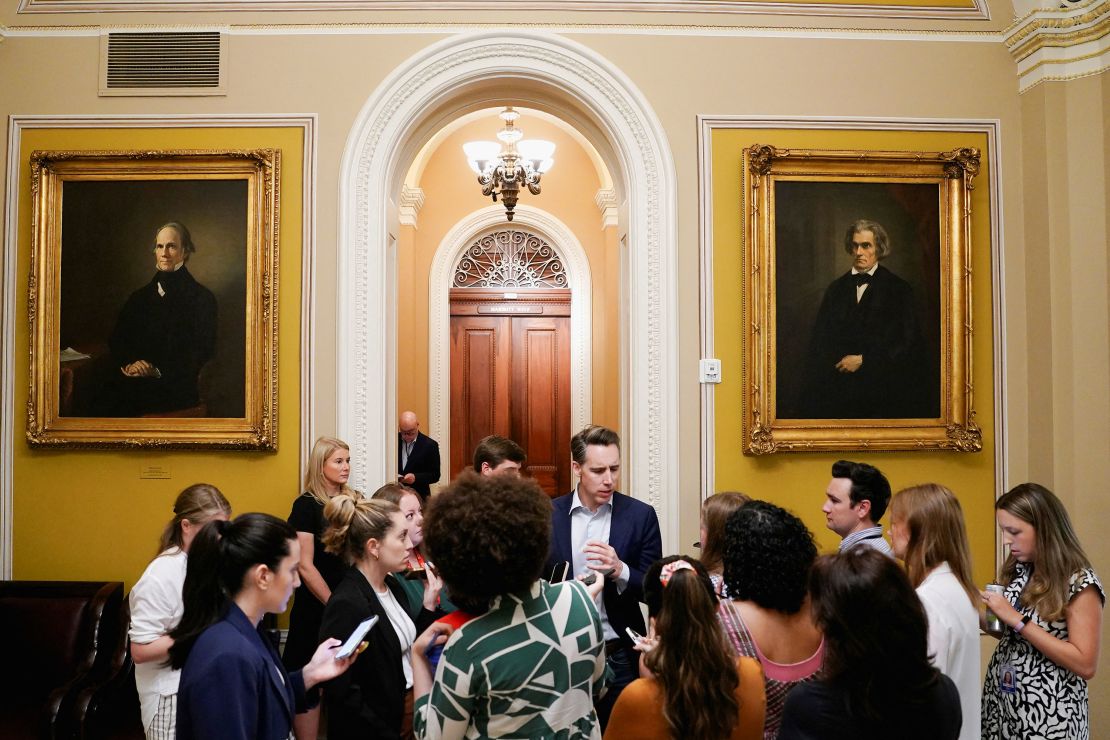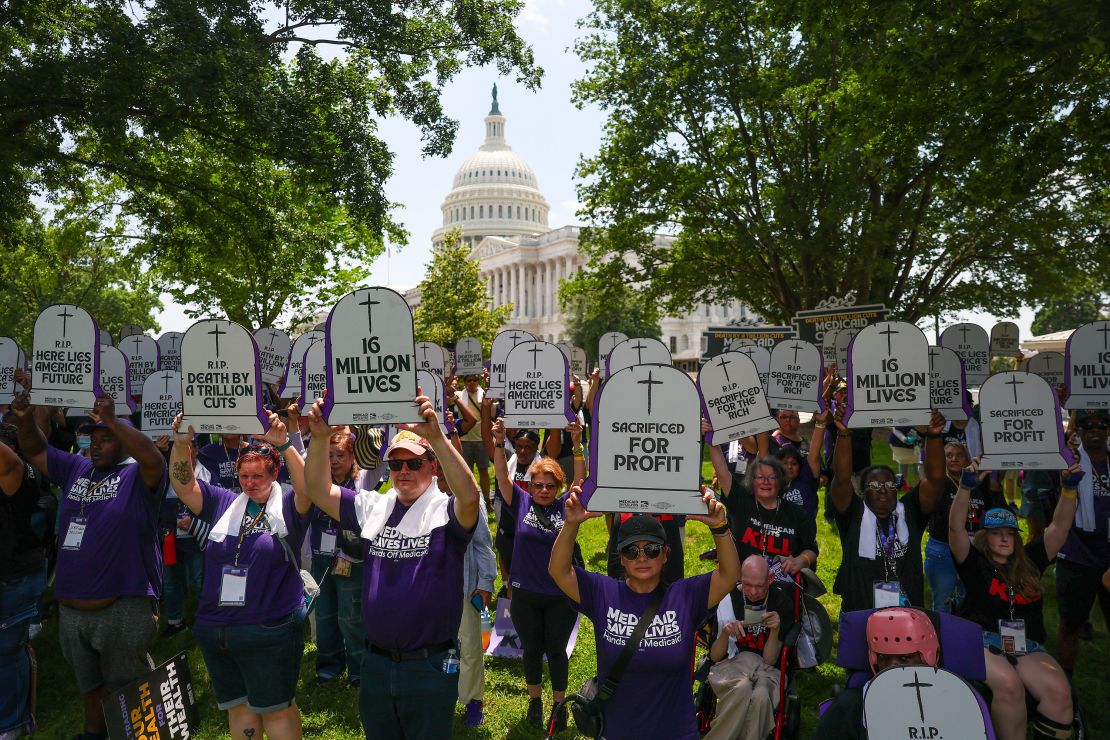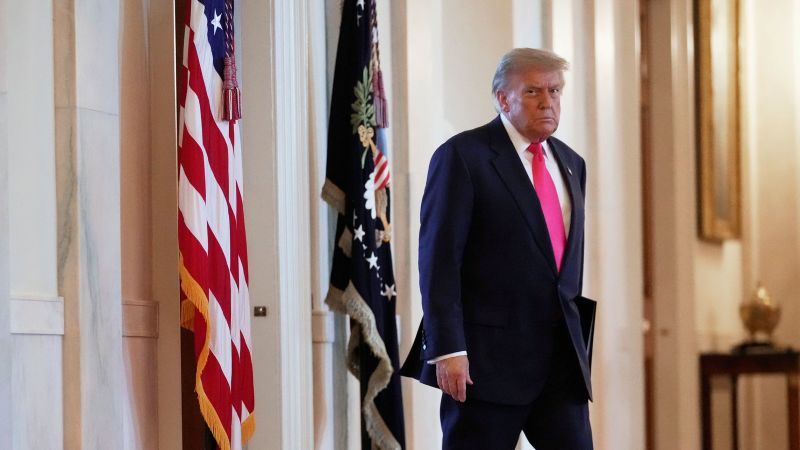CNN
—
President Donald Trump has the chance to accelerate his political momentum and tighten his power grip on the country by driving his most significant piece of second-term legislation through Congress and taking a July Fourth victory lap.
The measure, dubbed the “One Big Beautiful Bill Act” with the president’s trademark provocative hyperbole, is Trump’s attempt to engineer lasting change through legislation in an administration that is also wielding huge and questionable executive power.
It is significant for its own sake, both ideologically and symbolically. And its blend of vast tax cuts and reductions in social safety-net spending will have far-reaching political impacts for the country, Trump’s legacy and the GOP.
It codifies some of Trump’s key goals — from financing his deportation crackdown to slashing green energy projects. The legislation, which offers new benefits to working Americans but more strikingly rewards the rich, is a snapshot of the transformation and contradictions of the modern Republican Party.
But the bill is also part of the wider story of Trump’s second term. Days after he bombed Iran; stopped it and Israel firing missiles at each other; and celebrated a Supreme Court ruling that will facilitate his aggressive claims of executive authority, passing the bill would exemplify the growing power of a president dominating and disrupting this era in the US and abroad.
The Senate plowed on through Sunday in a marathon process expected to culminate in a final vote on Monday. That would leave a tight timeline for the House to act before the holiday — Trump’s preferred deadline.
Because senators made major modifications to the original House bill, the high-stakes legislative dance may see significant pushback from far-right House Freedom Caucus Republicans concerned about its effect on the national debt. Any changes designed to appease this group could mean the July 4 deadline slips, and the bill may need to be reconciled with the Senate version.
But the stakes for Trump are so high, and his control over the party’s base is so complete, that the bill is highly likely to become law in some form. And a compromise on state and local taxes in the Senate defused a brewing revolt by more moderate GOP House members who will be critical to the party’s hopes of holding on to its majority next year.
Republicans argue that the centerpiece bill of Trump’s second term will honor the promises that he made to Americans in his election victory last year.
“President Trump ran on this. He said we are going to change America for the better. We’re going to make sure that hardworking people can keep more of their money,” GOP Sen. Katie Britt of Alabama told CNN’s Jake Tapper on “State of the Union” Sunday.
“We’re going to make sure that we have secure borders, not just now, but for generations to come,” Britt said. “We’re going to make sure that we have a strong national defense. … We’re going to unleash American energy. And we’re going to make sure that people who have been unseen are seen.”
But Democrats blasted the bill’s permanent extension of Trump’s first-term tax cuts as a massive giveaway to the president’s rich friends and warned that cuts to Medicaid spending will shatter rural health care and hurt working Americans.
“What this does, and the baseline is all these cuts, all this cutback on health care, to provide the wealthiest in our country a disproportionate share of tax cuts, that just doesn’t seem fair,” Virginia Sen. Mark Warner told Tapper. “The more we can get that (message) out — I think this will be a political albatross.”
Which of these dueling political narratives comes closest to solidifying in the mind of voters could dictate the outcome of next year’s midterm elections.

This bill is the most tangible way for Trump to implement his 2024 campaign promises.
Presidents always face intense pressure to enshrine their attempts at political transformation into law. Doing so is critical to repaying their core supporters and replenishing their political capital. Failed legislative leaps erode perceptions of presidential power in Washington. And while the bill has plenty of provisions Republican lawmakers may find hard to defend, they’d dread an exhibition of failing to act on the mandate they believe they were handed by GOP voters even more.
Trump uses executive power more broadly and questionably than any modern president. But some of those unilateral acts could be quickly reversed by a Democratic successor. Changing laws locks in a more enduring legacy.
The “big, beautiful bill” is also critical to some of Trump’s most pressing priorities. It would, for instance, unlock massive funding for the border security and undocumented migrant expulsion plan at the center of his entire political project.
“We got a lot of people to look for, a lot of people to arrest, a lot of national security threats we know are in this country,” White House border czar Tom Homan said last week. “We need to find them. We need more money to do that, we need more agents to do that. For God’s sake, let’s pass this bill.”
Another Trump priority is boosting the exploitation of fossil fuels and unleashing the production of new American energy. The bill ends many Biden administration tax breaks and subsidies for alternative energy sources under what this White House calls the “Green New Scam.” But Democrats warn the bill is a job-killer for an emergent US green energy industry and a gift to global competitors such as China and Europe.
The bill also highlights how Trump has changed the Republican Party by showcasing the importance of populism and its limits. It makes good on Trump’s promise to remove taxes on tips and overtime in a boost for working Americans touted by the president in his 2024 campaign. But the broader tax policy contained in the bill is classic GOP orthodoxy, meaning that the more someone earns, the more dollars they are likely to gain from it. This is in keeping with a new era of American oligarchs cemented by a billionaire president and his Cabinet of billionaires and millionaires.
Independent sources also warn that — despite the administration’s highly questionable claims that the bill and so-far hypothetical trade deals would unleash growth — the measure would swell the national debt. The Congressional Budget Office estimated that the Senate version of the bill would boost the deficit by $3.3 trillion over a decade. This fiscal profligacy makes Elon Musk’s attempt to defenestrate the federal government at the Department of Government Efficiency seem more of an ideological initiative than a fiscal one. For all the claims of saving money and curtailing the deficit, the “big, beautiful bill” makes a far clearer statement of Trump’s attitude to debt and long-term national financial security.

The most politically consequential impact of the bill could lie in its attempt to push more of the burden of Medicaid spending onto the states and to introduce new work requirements for recipients of the federal health program. Republicans insist the bill will secure access and make the program more efficient.
“We are spending at a rate that we cannot continue. And, ultimately, that means that these programs would one day be insolvent for the very people that need them,” Britt said on “State of the Union.” “We want them to be safety nets, not hammocks that people stay in.”
But not all Republicans agreed. Missouri Sen. Josh Hawley secured delays in the implementation of some of changes to Medicaid before agreeing to vote for the bill. North Carolina Sen. Thom Tillis warned that many people in his state would lose Medicaid coverage under the bill and voted against advancing it Saturday, earning a Trump blast on social media. Hours later, Tillis, one of the few remaining GOP senators ready to criticize the president, announced he wouldn’t seek reelection next year, setting up an even more consequential race in his swing state.
The feud over Medicaid, as well as other cuts to nutrition programs for low-income Americans, offers an opening for a Democratic Party that has struggled to slow Trump.
“By almost a 2-to-1 margin, the American people hate this piece of legislation because it’s going to represent the biggest transfer of wealth and money from the poor and the middle class to the rich in the history of the country,” Democratic Sen. Chris Murphy said on NBC’s “Meet the Press.”
“The Congressional Budget Office, nonpartisan, says it’s going to kick between 10 and 15 million people off their health care,” the Connecticut Democrat continued. “And for what? To be able to afford a new $270,000 tax cut for the richest families in the country. New tax cuts for corporations, new tax cuts for billionaires.”
“This bill stinks. It’s a moral abomination. Everybody that learns about it hates it.”
The White House denies it is cutting funding for Medicaid or nutrition assistance and argues it’s merely cutting waste, fraud and abuse.
But Murphy is right on at least one thing: Almost every poll on the bill shows that it’s unpopular. CNN’s Aaron Blake reported this month that four recent polls from the Washington Post, Fox News, KFF and Quinnipiac University had the legislation underwater by an average of 24 points. On average, 55% of surveyed Americans opposed it, while 31% supported it.
This is one reason why, even with Trump’s deadline looming, the passage of the bill is not guaranteed. The reputation of every major piece of legislation is dependent on the political battle that is waged to define it in the views of voters once it passes. This is especially the case because the perceived benefits of any measure often become apparent more slowly than its political reverberations.
The bill is critical to Trump’s prestige and authority, and will be greeted as a massive triumph by the president if it passes. It could also turn into a quick liability for Republicans — in the same way as the Affordable Care Act and the American Rescue Plan Act did for Presidents Barack Obama and Joe Biden.
But in an era of one-term presidencies and narrow House majorities, the political onus is increasingly on parties and administrations to use power while they have it.

